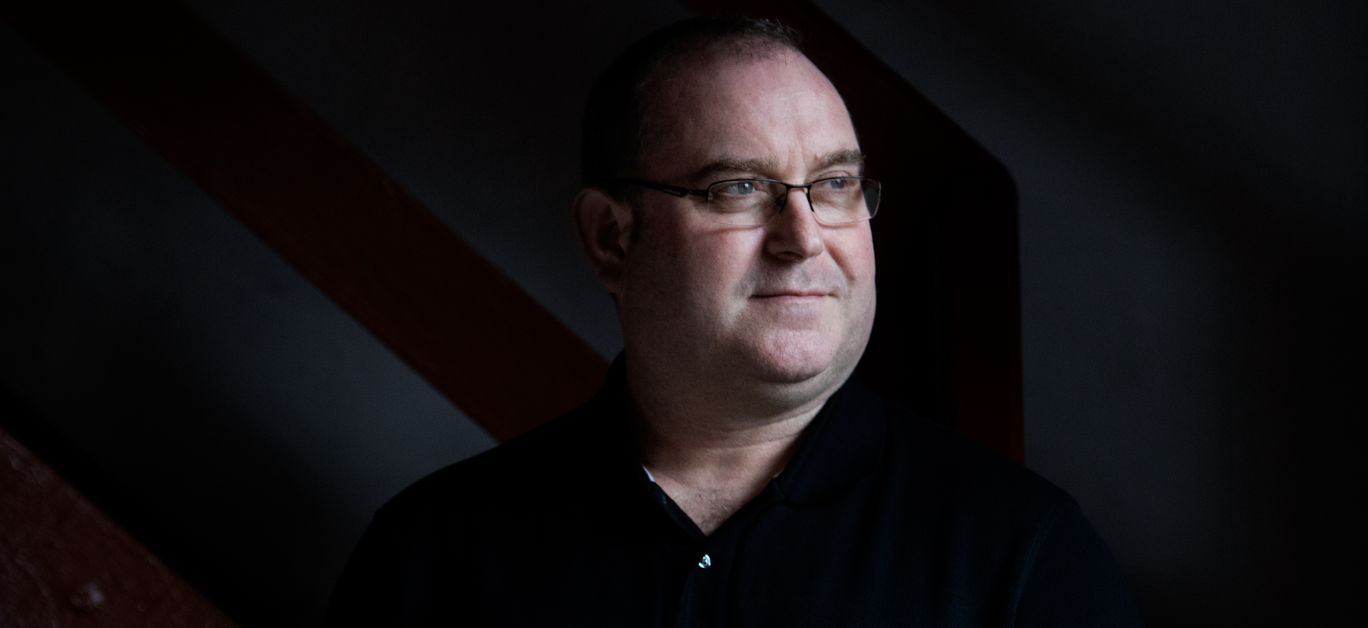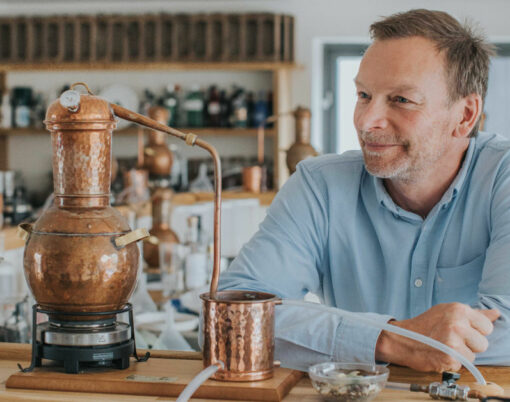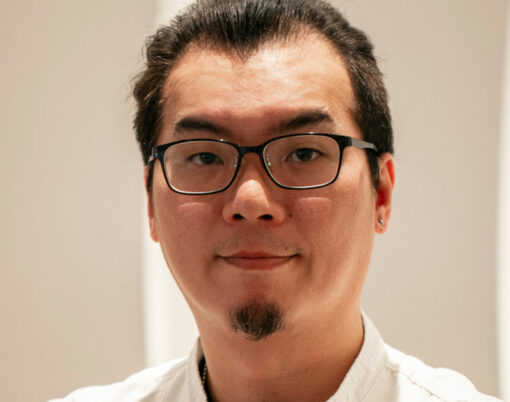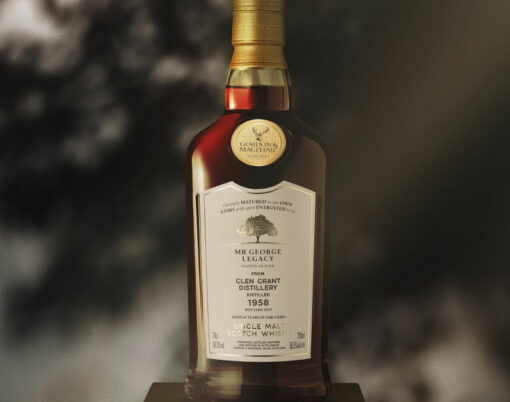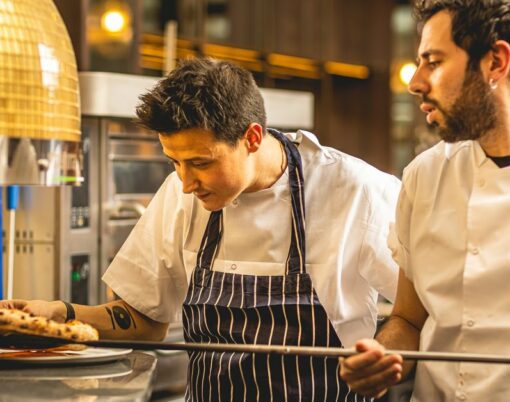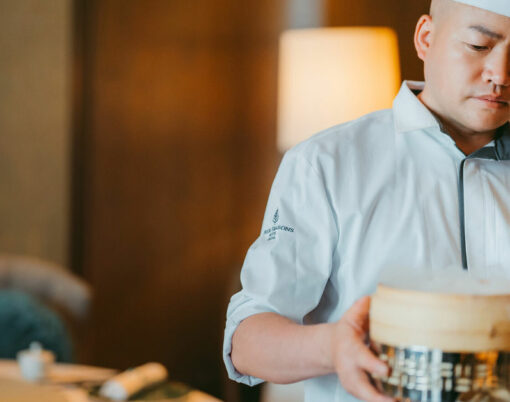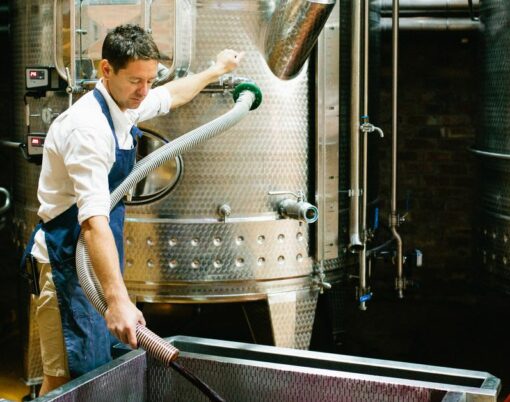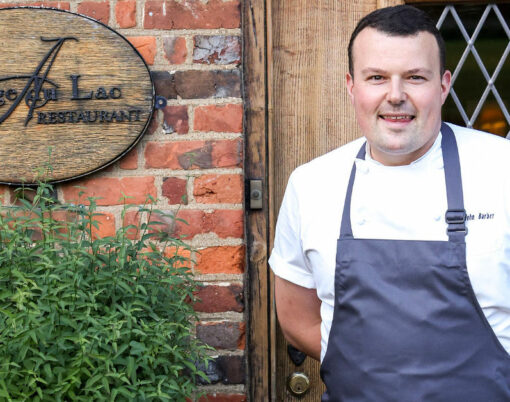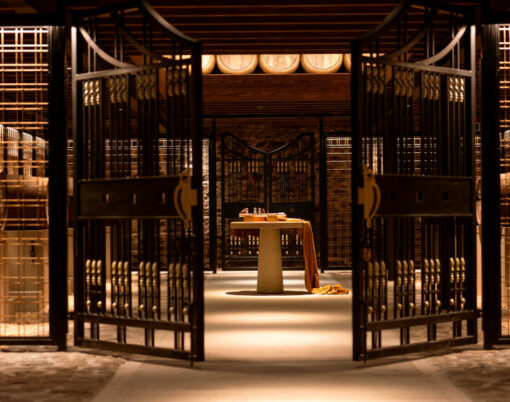Words by Benjamin Russell
Love. It’s the only word I can use to describe the way Keith Cruickshank talks about whisky, and at first, you’d be forgiven for thinking he’s actually telling you about his children.
“The 10-year-old’s not a teenager, but it’s got a lot of character about it. You’re just starting to see that personality coming out, beautiful, malty, spicy, delicate smoky whisky. That’s the 10-year-old.”
In fact, he’s telling me about the core range at Benromach, where he works as distillery manager on the outskirts of the ancient market town of Forres.
“And then there’s 15-year-old. It’s a teenager,” he says, beaming with pride. “It thinks it knows everything, but it doesn’t. Although it has had that bit longer to mature and to grow up. It’s the fruity version of the 10-year-old. Same DNA but has that fruitiness because it’s got that longer maturation.
“Then we’ve got the 21-year-old, really mellow and mature, it has all these different complex flavours coming through. They all have the same DNA, but they change as they mature. They’re siblings connected by a joint DNA but they’re all different.”
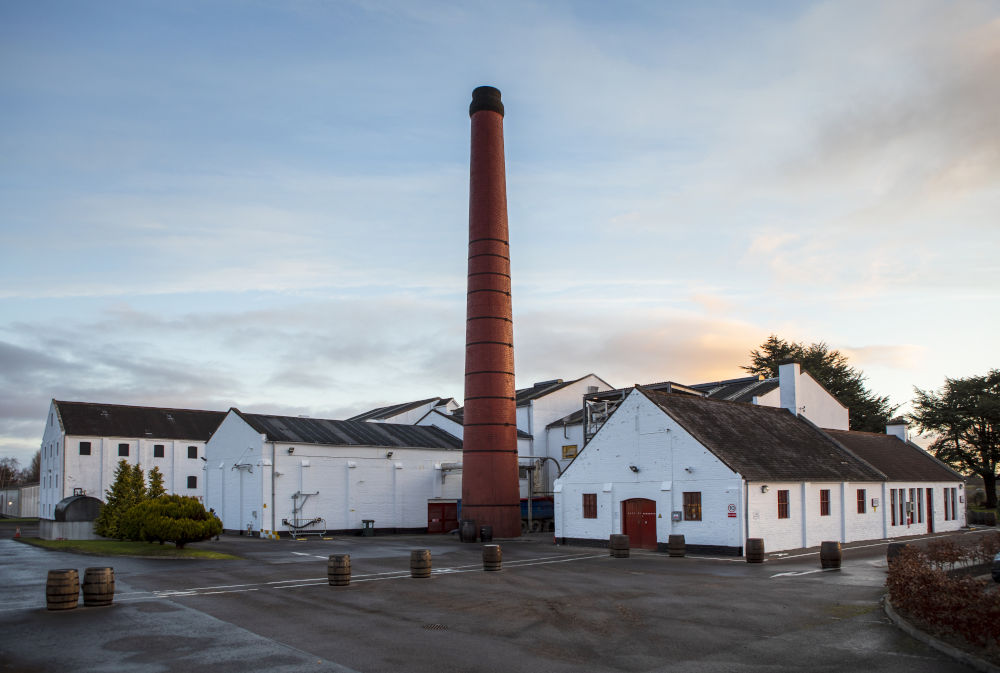
His parental feelings towards the whiskies he’s produced are understandable. When Keith started at a yet-to-be-opened Benromach he was newly married and his wife was eight months pregnant.
“Our son has grown up now, he’s 23, and the whiskies at the distillery have grown up at the same time,” he says. We’re bottling stuff now and I can remember when we made it and put it into casks.
“You make a product that takes all this time and to have a dream to remember the distillers who were there at the time and remember when the casks were filled and all the rest of it. I get a lot of satisfaction from that.”
One he remembers in particular is one of Benromach’s latest releases, a contrast whisky of which there are only around a thousand cases: “I remember filling that in 2012 and saying to myself ‘I wonder if anyone will like heavily peated Benromcah in sherry cask’ and low and behold almost 10 years later we’re bottling it.”
Keith describes the peat and sherry cask as ‘a marriage between a husband and wife’.
“It’s two strong personalities coming together. In this marriage you might think there’s going to be a clash, but it balances really well between the smokey and the sherry.”
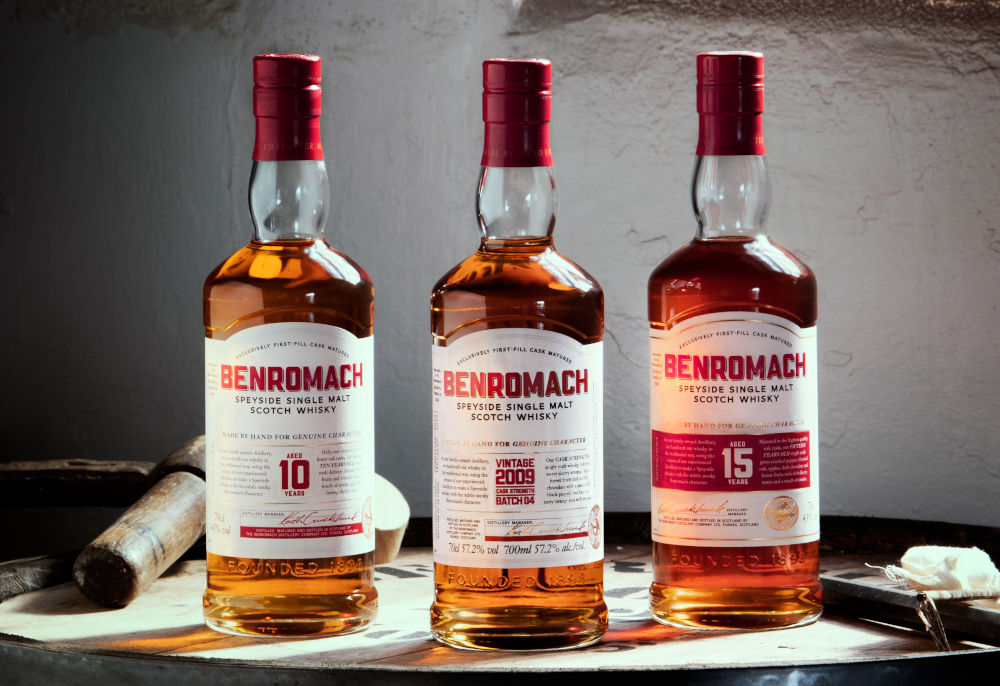
Family is a theme that seems to run right to the core of Benromach, which dates back to 1898. While the story usually goes that the big corporation buys up the little guy, here it is the other way round.
On the one hand, you have the Urquhart family, who were running an independent bottling company, Gordon and Macphail, and had long dreamed of owning their own distillery. And on the other, Scottish Malt Distillers, which was part of what is now the global drinks giant, Diageo – the then owners of Benromach.
“The family bought the distillery when Diageo weren’t really selling them off,” Keith says. “But back in 1993. Alan Rutherford, who was in charge of distilleries for them, sold Benromach to the family knowing that they would look after it and nurture it into a single malt brand rather than just sell it to whoever.”
Keith had been working for a multinational company producing Chivas Regal when he heard that the family bought Benromach. “I remember coming up to the distillery and they were just putting all the equipment in, the place was just in bits, but I thought, I’m 30-years-old now, am I going to get this opportunity again? I don’t know where it could lead. So I went for it, I took the leap of faith, and it’s the best thing I’ve ever done.”
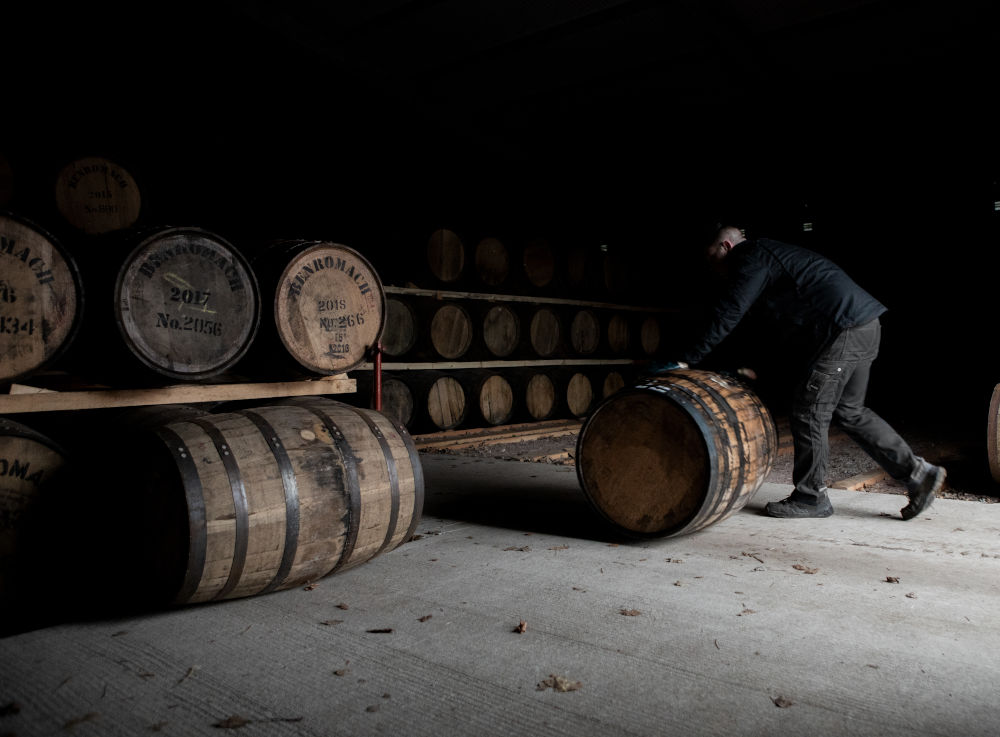
With a newly acquired distillery in hand, the Urquharts had a specific character in mind for the whisky they wanted to produce; a particular style of Speyside that harked back to before the 1960s, one that no longer existed, beautifully balanced with a light touch of smoke.
Having bottled many Speysides, including Benromach, they looked back over their samples to find whiskies of the right kind. What they discovered was that the characteristics they were looking for weren’t just a case of recipe, but a matter of method.
“All the distilleries making that type of Speyside were all mechanical and all using floor maltings,” Keith explains. “Now malt is bought commercially but back then malting was done on site. In the late 60s that changed from malting onsite and that’s where that delicate smokiness disappeared.”
And so Benromach’s approach to whisky making was born. Everything is done by hand, its small team of distillers relying entirely on their expertise and senses.
“We take our time with everything, there’s no computers operating the process. Nothing happens here unless one of my distillers makes it happen. They control everything. We run the distillery like it would have been a hundred years ago. Very hands on.
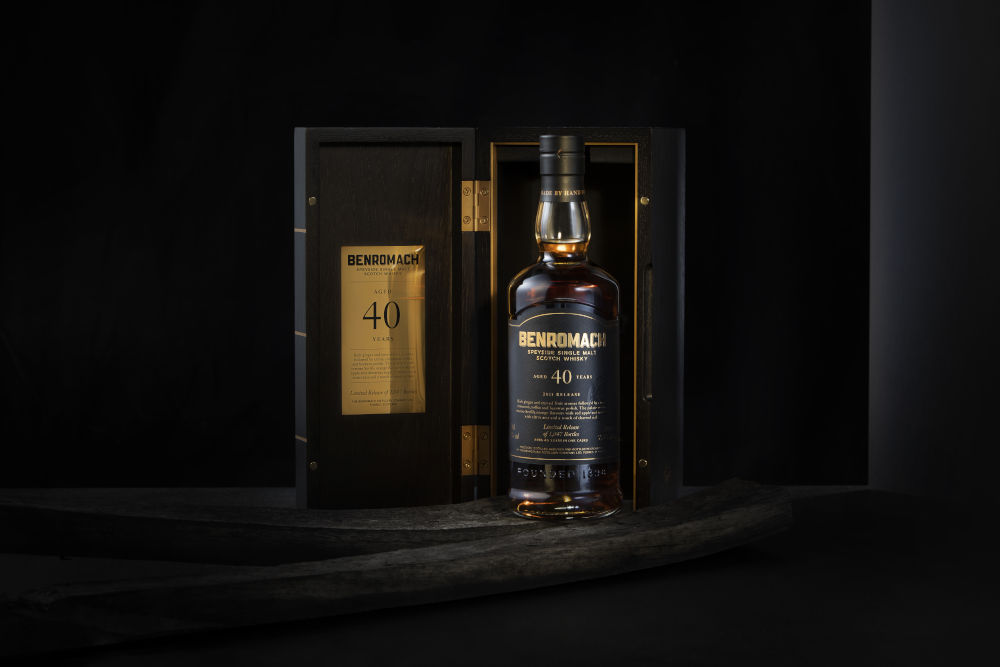
“There’s certain times when things should be making different sounds at different levels, it’s like an orchestra. “You’ve got the motors and the pumps and the steam, they all make different noises at different times, I know when something’s not right, you can hear it.
“That’s where the team has got a build up of experience to understand it. You’re not relying on anything but that. Every batch at Benromach is slightly different and the team needs to know how you control that. It’s the inconsistency that makes the consistency.”
The handmade approach can have its pitfalls though, especially when it comes to taking on staff, Keith says.
“It takes a lot of time to train someone here because if we are letting them fly solo we have to know they’re not going to crash, because there’s nothing there to stop them doing it, there’s no automatic pilot, so it takes about three months to train a distiller just to know what they should do. Then he or she will start to learn how to actually be a distiller after that.”
The handcrafted approach of Benromach was something of a novelty in the 90s, but that’s changing, Keith tells me: “It was a very small club. Now you have this fantastic whisky industry with so many new distilleries and they’re all of the same size producing beautiful, small batch whiskies, and that’s so refreshing for the industry to have that coming back.
“But we’re lucky because we’re 23 years down the road and we have all these whisky stocks, while they’ve got the challenge of coming into the industry with no stocks. That can be very challenging. You would need to have a lot of support from the company that owns it, the shareholders but we had that through the family – now we can pay the company and the family back with the whiskies that we have”.
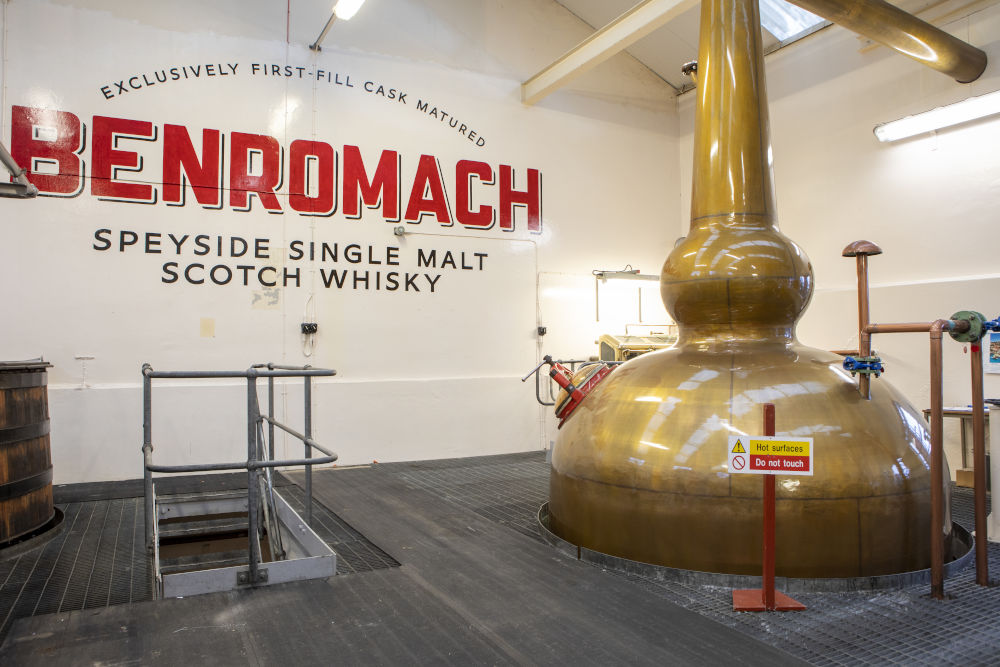
And it’s this coming of age that makes Benromach such an exciting distillery right now, and fittingly Benromach has just released a 40-year-old.
“It was made by the previous owners in 1981 and matured in lovely first-fill Oloroso sherry casks. It’s full of mellow spices, cinnamon and ginger, there’s just so much flavour. Old whiskies develop so much flavour over the years, especially sherry cask, they just keep on giving the past 25 years.”
With an impressive core range, some exciting contrast whiskies and now a 40-year-old on offer, I ask Keith what his goals are for the future.
“We’ve got a 21-year-old, we will probably have an older sibling to that, and other whiskies will happen because we made them 10-15 years ago. We’ve got the older statesmen and the lovely experiments we’ve tried throughout the years. But do you know what it’s all about for me? Passing on my experience to the next generation. I have all the stories and experiences that were handed down to me, and unless I can hand that back it’s lost.
“The assistant manager is the same age as when I started. I love having the beautiful whiskies but that’s my legacy, and they’ve got their legacy to carve out for themselves. I got the opportunity to do that in exactly the same way. It sounds a bit sentimental but it’s absolutely true.
“It’s what we do here at the distillery. It’s a great place to work. We look after each other and we work together. Sometimes we fall out – of course we do – that’s what families do but that’s what makes it stronger, and as the saying goes, if you love your job, you’ll never work another day in your life.”
But what of Keith’s whiskies, what mark does he want them to leave on the world?
“There’s fewer than 10 iconic whiskies in Scotland and they’re all quite quirky; where they’re based; the way the equipment has been set up, and I hope Benromach can be one of them. So people just taste it and just say: ‘Jesus – that’s Benromach’.”
Factbox
Whiskies in Benromach’s core range start from £39.99. A bottle of Contrasts: peat smoke and sherry cask matured, costs £49.99. Benromach 40-year-old is limited to just over 1,000 bottles, selling at £1,500 each. For more information visit benromach.com.












